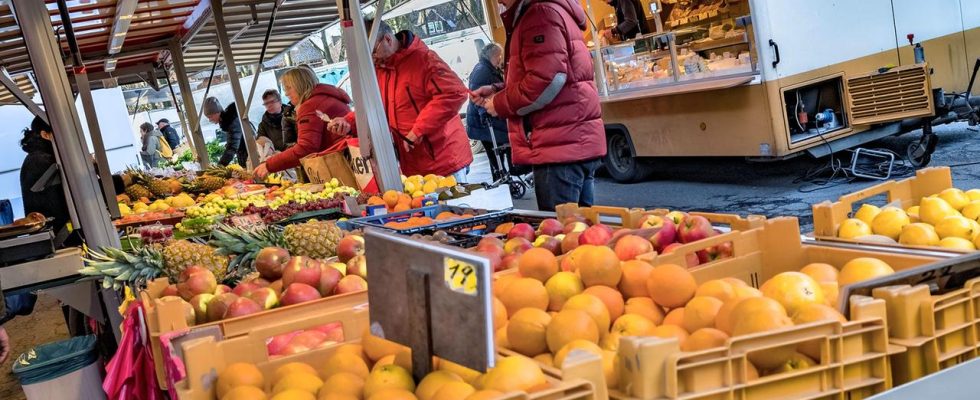Weekly markets are not only a place for regional products, but also a meeting place. But dealers are finding it increasingly difficult to find successors for their stands.
It is only a few meters away from KaDeWe, and yet the shopping experience could hardly be more different: At the farmers’ market on Berlin’s Wittenbergplatz there are neither luxury brands nor champagne, but primarily agricultural products from the surrounding area – meat, fish, cheese, vegetables and bread from Berlin and Brandenburg.
“This is one of the most beautiful markets we have in Berlin,” says Michael Schiffer. The 63-year-old teacher comes here every Thursday. He bought fresh Maultaschen. “You simply have a completely different relationship with the sellers here. You know that you are getting handmade things here and that they taste good afterwards.”
Business is going well for most retailers
Despite such enthusiastic customers, the mood among some retailers is clouded. “Right now is a difficult time because people are saving so much,” says Anke Fischer. She has been a dealer at the farmers’ market on Wittenbergplatz for a long time. The 62-year-old has been running a market stall for 28 years, standing at various weekly markets and selling fresh pasta there. “People have less money in their pockets and therefore buy less at the weekly market and more at discount stores.”
Sebastian Stahl hears similar things from many of his market traders. He is on the board of the German Market Guild, a private company that operates 170 weekly markets across Germany. Many retailers have had to accept losses in sales over the past two years. However, there are regional differences.
For the majority, business was going well, says Olaf Lenz, federal chairman of the weekly markets specialist group in the Federal Association of German Showmen and Market Merchants (BSM). “The purchasing power is there. Corona played into our hands – we had the opportunity to create distances, which was not the case in supermarkets.” The markets boomed during that time, says Lenz. “Now we are back to the level of 2019, but stable.”
Difficult to find successor
The main problem is different, say both experts. “Many feeders belong to the boomer generation. They are now retiring or have already retired and cannot find a successor,” says Stahl.
Beekeeper Martin Perschke can also confirm this. The 43-year-old has not been on the market at Wittenbergplatz for that long. Nevertheless, he has already experienced a lot here. Last year, Perschke says, he sold honey to the British King Charles when he was in Berlin for his inaugural visit. There is a photo of it on his stand.
The honey business is relatively stable, he says. But Perschke has also experienced how others had to close. “Many small retailers have given up,” said the dealer. “For example, there was a greengrocer over here who was here for 25 years and then suddenly left. He had to stop because he couldn’t find any employees who wanted to do the job.”
Too much bureaucracy and hard work
There are still 30,000 market traders in Germany, says Lenz from the BSM. However, the number is decreasing. One of the reasons is bureaucracy. Temperature checks, regular cleaning: everything has to be recorded. Even though hygiene and controls are important, the burden has increased enormously, he criticizes.
Lenz himself supplies three weekly markets in Hamburg. “My grandfather is 96 and he worked at the market until he was 70. When I show him what kind of folders I have here, he throws his hands up in his head.”
“The market is also a meeting place”
Just a few kilometers from the market at Wittenbergplatz in Berlin, Juri-Dietmar Ivanoff sells vegetables at a small market on Suarezstrasse in Charlottenburg. He comes from Beelitz and runs one of two stalls that are still here at the market. With regard to his own retirement, he also says that it will be difficult to find a successor.
The 54-year-old also doesn’t have enough sales staff. It’s a hard job that hardly anyone is enthusiastic about anymore. “I get up at 2 a.m. and am home at 6 p.m.,” he says. “Nobody really wants to do that anymore.”
Ivanoff is a third-generation market trader – just like Olaf Lenz in Hamburg. Lenz can already imagine that the number of markets will decrease in the coming years. However, he is convinced that they will not disappear. “Weekly markets have been around since the Middle Ages, we’re not just there for trading. The market is also a meeting place, a place to meet and exchange ideas. Many of my customers have known me since I was in a baby carriage.”

